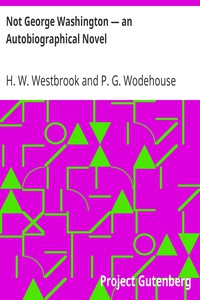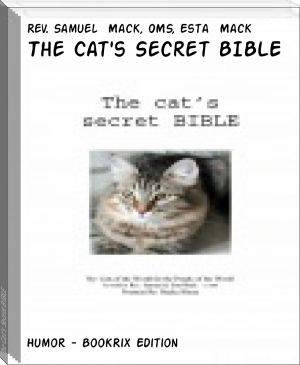Not George Washington — an Autobiographical Novel by Westbrook and Wodehouse (thriller books to read txt) 📗

- Author: Westbrook and Wodehouse
Book online «Not George Washington — an Autobiographical Novel by Westbrook and Wodehouse (thriller books to read txt) 📗». Author Westbrook and Wodehouse
We had also in our drawer a book of American witticisms, published in New York. To cut one out, preface it with "A good American story comes to hand," and pin it on a slip was a pleasing variation of the usual mode of constructing a paragraph. Gresham and I each had our favourite method. Personally, I had always a partiality for dealing with "buffers." "The brakes refused to act, and the train struck the buffers at the end of the platform" invariably suggested that if elderly gentlemen would abstain from loitering on railway platforms, they would not get hurt in this way.
Gresham had a similar liking for "turns." "The performance at the Frivoli Music Hall was in full swing when the scenery was noticed to be on fire. The audience got a turn. An extra turn."
Julian Eversleigh, to whom I told my experiences on the Orb, said he admired the spirit with which I entered into my duties. He said, moreover, that I had a future before me, not only as a journalist, but as a writer.
Nor, indeed, could I help seeing for myself that I was getting on. I was making a fair income now, and had every prospect of making a much better one. My market was not restricted. Verses, articles, and fiction from my pen were being accepted with moderate regularity by many of the minor periodicals. My scope was growing distinctly wider. I found, too, that my work seemed to meet with a good deal more success when I sent it in from the Orb, with a letter to the editor on Orb notepaper.
Altogether, my five weeks on the Orb were invaluable to me. I ought to have paid rather than have taken payment for working on the column. By the time Fermin came back from Scotland to turn me out, I was a professional. I had learned the art of writing against time. I had learned to ignore noise, which, for a writer in London, is the most valuable quality of all. Every day at the Orb I had had to turn out my stuff with the hum of the Strand traffic in my ears, varied by an occasional barrel-organ, the whistling of popular songs by the printers, whose window faced ours, and the clatter of a typewriter in the next room. Often I had to turn out a paragraph or a verse while listening and making appropriate replies to some other member of the staff, who had wandered into our room to pass the time of day or read out a bit of his own stuff which had happened to please him particularly. All this gave me a power of concentration, without which writing is difficult in this city of noises.
The friendship I formed with Gresham too, besides being pleasant, was of infinite service to me. He knew all about the game. I followed his advice, and prospered. His encouragement was as valuable as his advice. He was my pilot, and saw me, at great trouble to himself, through the dangerous waters.
I foresaw that the future held out positive hope that my marriage with Margaret would become possible. And yet——
Pausing in the midst of my castle-building, I suffered a sense of revulsion. I had been brought up to believe that the only adjective that could be coupled with the noun "journalism" was "precarious." Was I not, as Gresham would have said, solving an addition sum in infantile poultry before their mother, the feathered denizen of the farmyard, had lured them from their shell? Was I not mistaking a flash in the pan for a genuine success?
These thoughts numbed my fingers in the act of writing to Margaret.
Instead, therefore, of the jubilant letter I had intended to send her, I wrote one of quite a different tone. I mentioned the arduous nature of my work. I referred to the struggle in which I was engaged. I indicated cleverly that I was a man of extraordinary courage battling with fate. I implied that I made just enough to live on.
It would have been cruel to arouse expectations which might never be fulfilled. In this letter, accordingly, and in subsequent letters, I rather went to the opposite extreme. Out of pure regard for Margaret, I painted my case unnecessarily black. Considerations of a similar nature prompted me to keep on my lodging in Walpole Street. I had two rooms instead of one, but they were furnished severely and with nothing but the barest necessaries.
I told myself through it all that I loved Margaret as dearly as ever. Yet there were moments, and they seemed to come more frequently as the days went on, when I found myself wondering. Did I really want to give up all this? The untidiness, the scratch meals, the nights with Julian? And, when I was honest, I answered, No.
Somehow Margaret seemed out of place in this new world of mine.
CHAPTER 6 — NEW YEAR'S EVE
(James Orlebar Cloyster's narrative continued)
The morning of New Year's Eve was a memorable one for me. My first novel was accepted. Not an ambitious volume. It was rather short, and the plot was not obtrusive. The sporting gentlemen who accepted it, however—Messrs. Prodder and Way—seemed pleased with it; though, when I suggested a sum in cash in advance of royalties, they displayed a most embarrassing coyness—and also, as events turned out, good sense.
I carried the good news to Julian, whom I found, as usual, asleep in his hammock. I had fallen into the habit of calling on him after my Orb work. He was generally sleepy when I arrived, at half-past eleven, and while we talked I used to make his breakfast act as a sort of early lunch for myself. He said that the people of the house had begun by trying to make the arrival of his breakfast coincide with the completion of his toilet; that this had proved so irksome that they had struck; and that finally it had been agreed on both sides that the meal should be put in his room at eleven o'clock, whether he was dressed or not. He said that he often saw his breakfast come in, and would drowsily determine to consume it hot. But he had never had the energy to do so. Once, indeed, he had mistaken the time, and had confidently expected that the morning of a hot breakfast had come at last. He was dressed by nine, and had sat for two hours gloating over the prospect of steaming coffee and frizzling bacon. On that particular morning, however, there had been some domestic tragedy—the firing of a chimney or the illness of a cook—and at eleven o'clock, not breakfast, but an apology for its absence had been brought to him. This embittered Julian. He gave up the unequal contest, and he has frequently confessed to me that cold breakfast is an acquired, yet not unpleasant, taste.
He woke up when I came in, and, after hearing my news and congratulating me, began to open the letters that lay on the table at his side.
One of the envelopes had Skeffington's trade mark stamped upon it, and contained a bank-note and a sheet closely type-written on both sides.





Comments (0)